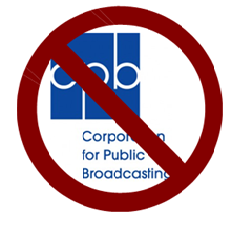By Rebekah Rast
This year alone, American taxpayers spent $420 million to fund the Corporation for Public Broadcasting (CPB).
Due to the downswing of the economy, CPB has requested $604 million for Fiscal Year 2013.
“Businesses and families have been forced to cut their budgets because of the poor economy, CPB should too,” said Sen. Jim DeMint (R-SC) in an op-ed in the Washington Examiner stating his support for defunding CPB.
This is not a new agenda for Capitol Hill. In June, Rep. Lamborn introduced H.R. 5538, which would effectively prohibit federal funding for CPB after FY 2012.
“The Corporation for Public Broadcasting puts out some programs that I enjoy and a lot of people enjoy, but they can stand on their own two feet,” Lamborn says in an exclusive interview with Americans for Limited Government (ALG). “In fact, 87 percent of their money comes from sources other than the U.S. taxpayer. So why should we, in days of $1 trillion annual deficits, give money to a corporation or any company that can fund itself.”
CPB is a nonprofit that receives about 13 percent of its funding from the federal government—meaning taxpayers.
ALG and other fiscally conservative organizations strongly support Rep. Lamborn’s legislation and were pleased to hear through various sources that Sens. DeMint and Tom Coburn (R-OK) are planning to introduce similar legislation in the Senate.
“I think in this current environment in the United States the original intent behind public broadcasting is no longer relevant,” says Bill Wilson, president of ALG. “Public broadcasting was originally enacted when there were three network television channels and limited access to news and information. Today there is literally hundreds of cable channels, thousands of blogs and Internet sites from any number of credible entities.”
Wilson went on to say, “Corporation for Public Broadcasting is a total luxury. It is a luxury in the sense that this is not something people can’t get other places. Clearly there isn’t enough of a market for it because if there were, it wouldn’t need government taxpayer money just to pay its salaries and pay its overhead.”
Sen. DeMint obviously agrees.
“Both National Public Radio and the Public Broadcasting Service claim only a small portion of their overall budget comes from the taxpayer. That means they should be able to do without taxpayer support,” he said in the Washington Examiner op-ed.
With a $13.7 trillion national debt and a $1.3 trillion annual deficit, Congress is faced with many difficult decisions on how best to cut spending and relieve America and its taxpayers of its debt burden.
“Americans deserve a smaller, more affordable government,” DeMint said in his article. “Taxpayers are sick of getting stuck with the tab for needless programs. In the age of satellite TV and radio, Internet, and video on demand, subsidies for public broadcasting shouldn’t be part of their bill.”
Rep. Lamborn says cutting CPB is an easy first step. Sen. DeMint agrees.
“Shows like ‘Sesame Street’ are thriving, multimillion-dollar enterprises,” DeMint points out as an example of why PBS doesn’t need taxpayer funding. “According to the 990 tax form all nonprofits are required to file, Sesame Workshop President and CEO Gary Knell received $956,513—nearly a million dollars—in compensation in 2008. And, from 2003 to 2006, ‘Sesame Street’ made more than $211 million from toy and consumer product sales. Big Bird will be just fine without his federal subsidies.”
Rebekah Rast is a contributing editor to the Americans for Limited Government (ALG) News Bureau.


